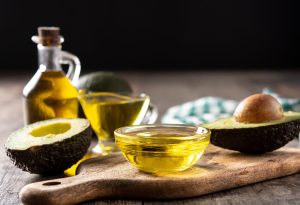
Key relevance of avocado oil. This is a nutrient-dense, multipurpose oil with many health and aesthetic advantages. Avocado oil is a useful addition to your cooking and personal care regimen, with benefits ranging from boosting nutrient absorption and encouraging hair development to supporting heart health and improving skin hydration. Adopting the advantages of avocado oil can result in a better lifestyle and enhanced general well-being.
KEY RELEVANCE OF AVOCADO OIL
Because of its moderate flavor and high smoke point, avocado oil is used in cooking and has several health benefits, including promoting heart health by decreasing blood pressure and bad cholesterol. Avocado oil is also prized for its benefits to the skin and hair, including its ability to hydrate, lower inflammation, and encourage the production of collagen.
1. Healthy heart;

Avocado’s oil is high in monounsaturated fats, particularly oleic acid, which is known for its heart-healthy properties. These fats help reduce bad cholesterol (LDL) levels while increasing good cholesterol (HDL). The oil also contains beta-sitosterol, a plant sterol that can further support heart health by blocking cholesterol absorption in the intestines. Regular consumption of avocado’s oil can lead to better cardiovascular health and a reduced risk of heart disease.
Packed with vitamins A, D, and E, avocado oil is a powerful moisturizer for the skin. Its rich composition allows it to penetrate deeply into the skin, providing long-lasting hydration. The vitamins and antioxidants in avocado’s oil help to nourish and protect the skin from environmental damage, promoting a healthy and radiant complexion. Additionally, its anti-inflammatory properties can soothe and heal dry, irritated, or sensitive skin conditions such as eczema and psoriasis.
3. Anti-Inflammatory and Antioxidant Properties;

KEY RELEVANCE OF AVOCADO OIL
Avocado oil contains a variety of potent antioxidants, including carotenoids and tocopherols, which help combat oxidative stress and reduce inflammation. These properties make avocado oil beneficial for reducing the risk of chronic diseases associated with inflammation, such as arthritis and certain types of cancer. Applying avocado oil topically can also help reduce inflammation and promote the healing of minor wounds, cuts, and burns.
4. Improved Nutrient Absorption;

KEY RELEVANCE OF AVOCADO OIL
One of the unique benefits of avocado oil is its ability to enhance the absorption of fat-soluble vitamins and nutrients from other foods. When used in salads or other dishes, avocado oil helps the body absorb more nutrients, such as beta-carotene and lutein, from vegetables. This improved nutrient absorption can contribute to better overall health, including enhanced immune function and eye health.
5. Hair Health and Growth;

Avocado oil is an excellent natural conditioner for hair. Its rich fatty acid content helps to nourish and moisturize the scalp, reducing dryness and dandruff. The oil’s vitamins and minerals strengthen hair strands, reducing breakage and promoting healthy hair growth. Applying avocado’s oil to the hair can add shine, smoothness, and manageability, making it a popular ingredient in hair care products.
How to Use Avocado Oil;

KEY RELEVANCE OF AVOCADO OIL
– Cooking:
Avocado’s oil has a high smoke point, making it suitable for frying, grilling, and baking. Its mild, nutty flavor enhances salads, marinades, and sauces.
– Skin Care:
Apply a small amount directly to the skin as a moisturizer or add a few drops to your favorite skincare products.
– Hair Care:
Use as a deep-conditioning treatment by massaging the oil into the scalp and hair, then rinsing after 30 minutes.
Summary
Extracted from the flesh of avocados, avocado oil is a nutrient-dense oil with numerous health and cosmetic advantages. Packed with vitamins, minerals, and good fats, this multipurpose oil has become well-known for its many uses.